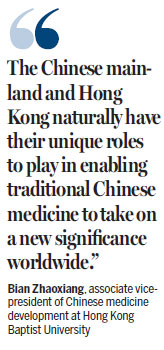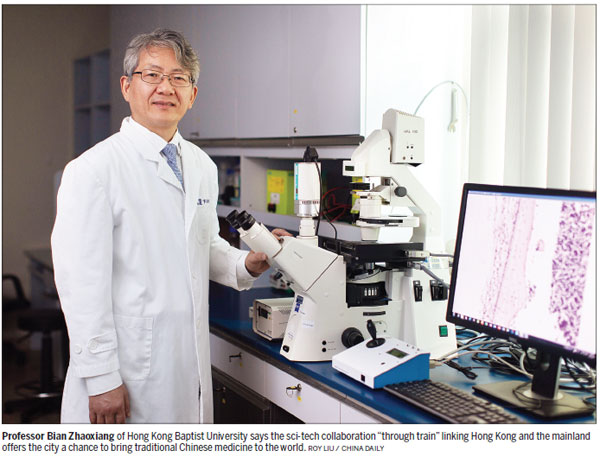HK could lead 'going global' drive for traditional medicine
Updated: 2018-05-17 06:00
By luo weiteng in Hong Kong(HK Edition)
|
|||||||
Greater cooperation in science and technology between the mainland and Hong Kong could help the city blaze a trail in the drive to take traditional Chinese medicine global, advises Professor Bian Zhaoxiang, associate vice-president of Chinese medicine development at Hong Kong Baptist University.
"Following the stock trading 'through train' schemes between Shanghai, Shenzhen, and Hong Kong, and with the upcoming launch of the high-speed 'through train' from the city's West Kowloon Station to Guangzhou South, we now have a cross-boundary sci-tech 'through train'," Bian said.
"Such an epoch-making move allows Hong Kong-based scientists and researchers greater access to national funding. More profoundly, it paves the way for local scientists to play a bigger and more direct part in nationwide undertakings to transform the world's second-largest economy into a genuine science and innovation powerhouse," he noted.

Some colleagues at HKBU's School of Chinese Medicine, which commemorates its 20th founding anniversary this year, had set about working out project proposals, Bian said.
His colleagues intended to take the lead in applying for national scientific research projects and hoped to see more details about project application, funding allocation and project assessment soon, he added.
"Scientific research is never a story of fighting alone. Collaboration stands as a big trend," Bian said. "The winning growth formula for more and more 'big projects' rests on the build-up of a platform for international cooperation, giving full play to participants' strengths."
One mega project under the global spotlight is the Guangdong-Hong Kong-Macao Greater Bay Area plan. This reinforces the theme of enhanced cross-boundary collaboration in a wide range of areas, including traditional Chinese medicine.
The Bay Area, known as the birthplace of Lingnan medicine, is believed to be an "ideal testing ground" to take traditional Chinese medicine to the international stage.
The Bay Area has what it takes to become the production and research regional base of traditional Chinese medicine. Capitalizing on the rich portfolio of pharmaceutical companies, it could serve as "fertile soil" for taking research and development from the laboratory to medicine shop shelves. The region's large aging population also provides a big push for fundamental research, he explained.
For years, the mainland has been a leading force in developing traditional Chinese medicine, bankrolling this field more than anywhere else. It is home to a wealth of research institutions and enterprises that boost this quintessential aspect of the Chinese culture.
"Since its return to the motherland in 1997, Hong Kong has made great strides in the development of traditional Chinese medicine. The city has sharpened its edge as a bridgehead and incubator to bolster the 'going global' vision of traditional Chinese medicine," Bian noted.
"The Chinese mainland and Hong Kong naturally have their unique roles to play in enabling traditional Chinese medicine to take on a new significance worldwide," Bian noted.
Bian, an expert in Chinese medicine clinical studies for three decades and an academic at HKBU for 18 years, said the more he's in the industry, the more he feels confident about the prospects of traditional Chinese medicine - whose vitality lies in its unique clinical efficacy.
The sci-tech "through train" scheme, setting the stage for collective efforts from the mainland and Hong Kong, signals a new phase in the development of traditional Chinese medicine in the modern world, he believed.
sophia@chinadailyhk.com

(HK Edition 05/17/2018 page4)